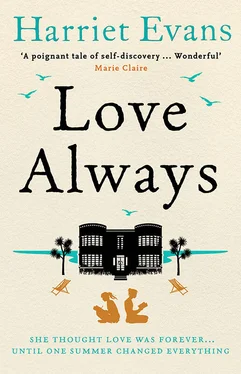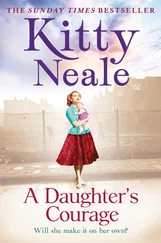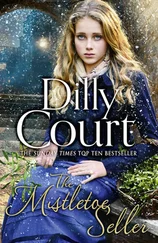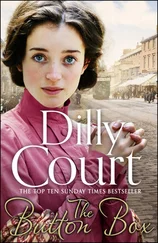HARRIET EVANS
Love Always

Copyright
HarperFiction
HarperCollins Publishers Ltd. 1 London Bridge Street London SE1 9GF
www.harpercollins.co.uk
Copyright © Harriet Evans 2011
Harriet Evans asserts the moral right to be identified as the author of this work
Extract from Rebecca reproduced with permission of Curtis Brown Group Ltd, London on behalf of the Estate of Daphne du Maurier
Copyright © Daphne du Maurier 1938
A catalogue record for this book is available from the British Library
This novel is entirely a work of fiction. The names, characters and incidents portrayed in it are the work of the author’s imagination. Any resemblance to actual persons, living or dead, events or localities is entirely coincidental.
All rights reserved under International and Pan-American Copyright Conventions. By payment of the required fees, you have been granted the non-exclusive, non-transferable right to access and read the text of this e-book on-screen. No part of this text may be reproduced, transmitted, down-loaded, decompiled, reverse engineered, or stored in or introduced into any information storage and retrieval system, in any form or by any means, whether electronic or mechanical, now known or hereinafter invented, without the express written permission of HarperCollins e-books.
Source ISBN: 9780007350223
Ebook Edition © 2011 ISBN: 9780007350247
Version 2015-09-08
For Chris I.W.O.
We can never go back, that much is certain.The past is still too close to us. The things we have tried to forget and put behind us would stir again, and that sense of fear, of furtive unrest, struggling at length to blind unreasoning panic – now mercifully stilled, thank God – might in some manner unforeseen become a living companion, as it had been before.
Rebecca , Daphne du Maurier
One crowded hour of glorious life
Is worth an age without a name.
Thomas Osbert Mordaunt, quoted by Mr Justice Marshall in his summing-up at the Stephen Ward trial, 30 July 1963
Contents
Cover
Title Page HARRIET EVANS Love Always
Copyright
Epigraph We can never go back, that much is certain.The past is still too close to us. The things we have tried to forget and put behind us would stir again, and that sense of fear, of furtive unrest, struggling at length to blind unreasoning panic – now mercifully stilled, thank God – might in some manner unforeseen become a living companion, as it had been before. Rebecca , Daphne du Maurier One crowded hour of glorious life Is worth an age without a name. Thomas Osbert Mordaunt, quoted by Mr Justice Marshall in his summing-up at the Stephen Ward trial, 30 July 1963
Prologue
Part One: February 2009
Chapter One
Chapter Two
Chapter Three
Chapter Four
Chapter Five
Chapter Six
Chapter Seven
Chapter Eight
Chapter Nine
Chapter Ten
Chapter Eleven
Part Two: July 1963
Chapter Twelve
Chapter Thirteen
Chapter Fourteen
Chapter Fifteen
Chapter Sixteen
Chapter Seventeen
Chapter Eighteen
Chapter Nineteen
Chapter Twenty
Part Three: February 2009
Chapter Twenty-One
Chapter Twenty-Two
Chapter Twenty-Three
Chapter Twenty-Four
Chapter Twenty-Five
Chapter Twenty-Six
Chapter Twenty-Seven
Chapter Twenty-Eight
Chapter Twenty-Nine
Chapter Thirty
Chapter Thirty-One
Chapter Thirty-Two
Chapter Thirty-Three
Chapter Thirty-Four
Chapter Thirty-Five
Chapter Thirty-Six
Chapter Thirty-Seven
Part Four: March 2009
Chapter Thirty-Eight
Chapter Thirty-Nine
Chapter Forty
Chapter Forty-One
Chapter Forty-Two
Chapter Forty-Three
Chapter Forty-Four
Chapter Forty-Five
Chapter Forty-Six
Chapter Forty-Seven
Chapter Forty-Eight
Epilogue
Keep Reading
Excerpt from Happily Ever After
Acknowledgements
Bibliography
Other Books by Harriet Evans
About the Publisher
Prologue
Cornwall, 1963
If you close your eyes, perhaps you can still see them. As they were that sundrenched afternoon, the day everything changed.
Outside the house, in the shadows by the terrace, when they thought no one was looking. Mary is in the kitchen making chicken salad and singing along to Music While You Work on the Home Service. There’s no one else around. It’s the quiet before lunch, too hot to do anything.
‘Come on,’ she says. She is laughing. ‘Just one cigarette, and then you can go back up.’ She chatters her little white teeth together, her pink lips wet. ‘I won’t bite, promise.’
He looks anxiously around him. ‘All right.’
She has her back to him as she picks her way confidently through the black brambles and grey-green reeds, down the old path that leads to the sea. Her glossy hair is caught under the old green and yellow towel she has wrapped round her neck. He follows, nervously.
He’s terrified of these encounters – terrified because he knows they’re wrong, but still he wants them, more than he’s wanted anything in his life. He wants to feel her honey-soft skin, to let his hand move up her thigh, to nuzzle her neck, to hear her cool, cruel laugh. He has known a couple of women: eager, rough-haired girls at college, all inky fingers and beery breath, but this is different. He is a boy compared to her.
Oh, he knows it’s wrong, what they’re doing. He knows his head has been turned, by the heat, the long, light evenings, the intoxicating almost frightening sense of liberation here at Summercove, but he just doesn’t care. He feels truly free at last.
The world is becoming a different place, there’s something happening this summer. A change is coming, they can all feel it. And that feeling is especially concentrated here, in the sweet, lavender-soaked air of Summercove, where the crickets sing long into the night and where the Kapoors let their guests, it would seem, do what on earth they want . . . Being there is like being on the inside of one of those glass domes you have as a child, visible to the outside world, filled with glitter, waiting to be shaken up. The Kapoors know it too. They are all moths, drawn to the flickering candlelight.
‘Hurry up, darling,’ she says, almost at the bottom of the steps now in the bright light, the white dots on her blue polka-dot swimming costume dancing before his eyes. He clings to the rope handle, terrified once more. The steps are dark and slippery, cut into the cliffs and slimy with algae. She watches him, laughing. She often makes him feel ridiculous. He’s never been around bohemian people before. All his life, even now, he has been used to having rules, being told when to wash behind his ears, when to hand an essay in, used to the smell of sweaty boys – now young men – queuing for meals, changing for cricket. He’s at the top of the pile, knows his place there, he’s secure in that world.
He justifies it by saying this is different. It’s one last hurrah, and he means to make the most of it, even if it is terrifying . . . He stumbles on a slippery step as she watches him from the beach, a cigarette dangling from her lip. His knee gives way beneath him, and for one terrifying moment he thinks he will fall, until he slams his other leg down, righting himself at the last minute.
Читать дальше













